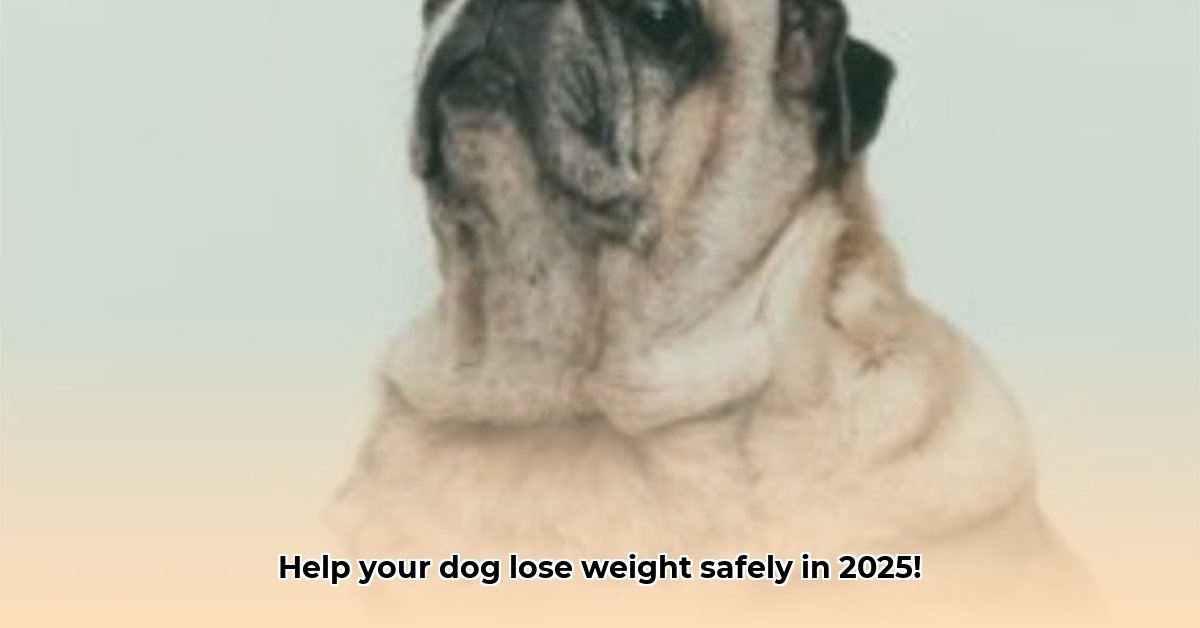
Is your furry friend carrying a few extra pounds? Many dog owners face this common challenge, and it's understandable to feel overwhelmed by the sheer volume of advice available. This guide provides a clear, vet-approved path to canine weight loss, focusing on safe and effective strategies, including the role of supplements. We'll walk you through everything from recognizing overweight in dogs to selecting appropriate supplements, providing practical tips to help your dog achieve and maintain a healthy weight. Remember, your veterinarian is your most valuable resource; their guidance is essential before making any dietary or lifestyle changes for your pet.
Understanding Dog Weight Loss Supplements: Beyond the Quick Fix
The market for pet supplements is vast, offering a wide array of options for weight management. These range from prescription medications like dirlotapide to natural ingredients such as L-carnitine and white kidney bean extract. Each product works differently, and their efficacy varies considerably. Some show promising results, while others require further scientific investigation. This underscores the crucial need for veterinary consultation. Never begin a supplement regimen without first discussing it with your veterinarian. They will tailor a plan to your dog's unique needs, considering age, breed, health conditions, and potential interactions with other medications.
Choosing the Right Supplement: Weighing the Pros and Cons
Below is a summary of some common dog weight loss supplements, their potential benefits, and drawbacks. Please note: this is not an exhaustive list, and ongoing research may alter our understanding of these products. Always consult your veterinarian for personalized advice.
| Supplement | Potential Benefits | Potential Risks | Veterinarian's Recommendation |
|---|---|---|---|
| Dirlotapide | Significant weight loss; proven medication | Requires veterinary supervision; potential side effects | Essential |
| L-Carnitine | Aids fat metabolism (helps the body use fat for energy) | Generally safe, but may cause gastrointestinal upset | Often Recommended |
| White Kidney Bean Extract | May inhibit starch absorption | May cause gastrointestinal upset | Often Recommended |
| L-Arginine | Limited evidence of weight loss benefit in dogs | Limited research; potential drug interactions | Likely Not Necessary |
| DHEA | Limited evidence of weight loss benefit in dogs; potential hormonal effects | Can impact hormone levels; requires careful monitoring | Generally Not Recommended |
| Omega-3 Fatty Acids | Supports overall health; potential role in weight management | May cause gastrointestinal upset; potential interactions with blood thinners | Often Recommended |
| Chitosan | Limited scientific evidence of effectiveness in dogs | May cause gastrointestinal issues; potential drug interactions; requires further research | Likely Not Necessary |
| CLA | Limited research on effectiveness in dogs | Limited canine research; potential drug interactions | Likely Not Necessary |
Important Note: Even supplements deemed "Often Recommended" require veterinary discussion. Your vet will determine the suitability for your dog's unique circumstances.
A Holistic Approach: More Than Just Supplements
Successfully managing canine weight requires a comprehensive strategy encompassing several key elements. Supplements are just one part of a larger, integrated approach.
Balanced Nutrition: Your veterinarian will help you determine the appropriate caloric intake for your dog, factoring in age, breed, activity level, and overall health. A balanced diet is the cornerstone of weight management.
Regular Physical Activity: Daily walks, playtime, and engaging activities are crucial for burning calories and maintaining muscle mass. It's a matter of establishing a healthy lifestyle for your dog.
Veterinary Monitoring: Regular checkups are essential for tracking progress, addressing potential side effects, and ensuring your dog's overall well-being. This is crucial for safety and effective management.
Gradual Weight Loss: Aim for a slow and steady weight reduction—typically no more than 1-2% of body weight per week. Rapid weight loss is detrimental to canine health.
Supplement Safety: Navigating the Market
The pet supplement industry lacks stringent regulation; therefore, caution is paramount. Choose reputable brands with transparent ingredient lists and evidence of testing. Never administer human supplements to your dog, as they are not formulated for canine physiology and may be harmful.
Choosing the Safest Dog Weight Loss Supplement for Your Breed
Before considering supplements, assess your dog's unique needs: breed, age, and pre-existing health conditions. These factors significantly influence the choice of a safe and effective supplement. A large, active breed will have different requirements than a smaller, senior dog. A tailored approach is always best.
The Importance of Veterinary Guidance (Reiterated)
This cannot be overstated: always consult your veterinarian before introducing any weight loss supplement. They will assess your dog's health, identify potential drug interactions, and consider breed-specific factors. Prioritizing your dog's well-being is paramount.
Evaluating Dog Weight Loss Supplements
When researching supplements, prioritize transparency. Carefully scrutinize labels, verifying ingredients and their origin. Avoid products with vague ingredient lists or excessive artificial additives. Look for evidence of third-party testing and quality control.
Steps to a Safe Weight Loss Plan
Veterinary Consultation: Schedule a comprehensive checkup to discuss your dog's weight and health.
Dietary Adjustment: Implement a veterinarian-recommended dietary plan. This is the most crucial aspect of weight management.
Increased Exercise: Gradually enhance your dog's physical activity.
Supplement Consideration: If approved by your veterinarian, carefully choose a supplement, initiating with a low dose.
Progress Monitoring: Regularly weigh your dog and monitor their progress, reporting any changes to your veterinarian.
Potential Risks and Side Effects
Even with veterinary approval, be aware of potential side effects such as gastrointestinal upset or allergic reactions. Careful monitoring and prompt veterinary attention for any unusual changes are crucial.
The Bottom Line: A Collaborative Effort
Dog weight loss supplements can be beneficial, but they should not replace a holistic approach to weight management. Combining a balanced diet, appropriate exercise, and veterinary guidance creates the most effective path toward a healthy weight for your canine companion. Remember, patience and consistency are key. The rewards are well worth the effort!